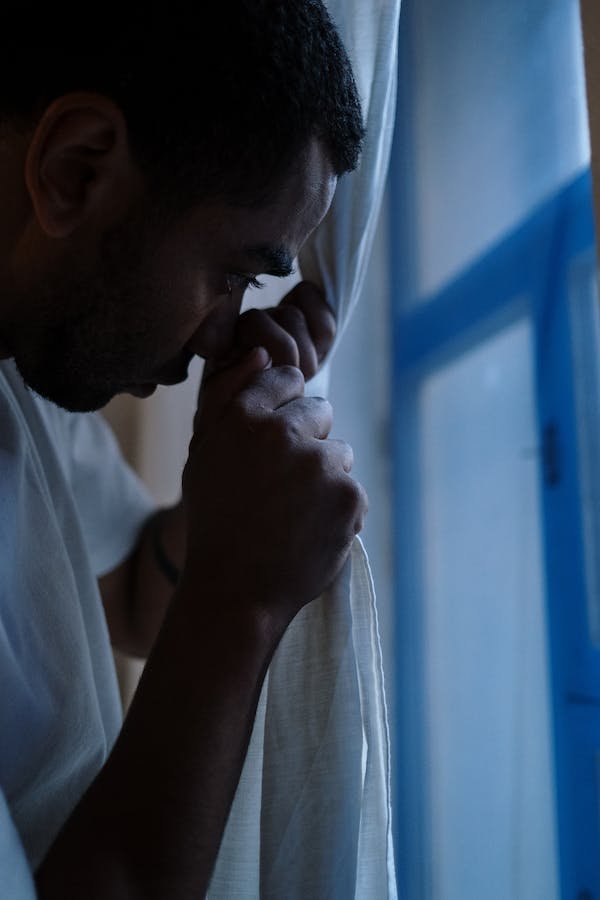Have you ever witnessed an obsessive person before? Obsession is real and a lot of people are a victim to the condition. It is one thing to be in love, and it is another thing to be obsessed, but before we get into details on obsessive disorders, let's talk about the existing difference between love and obsession.
A healthy relationship is one that gives room for appropriate space when necessary, but when you are being engrossed, or consumed with someone who never wants you out of their sight, not even for the purpose of a job or anything, may be showing a sign of obsession. An obsessive person shows clear signs of being controlling, defensive and even act in a resentful way sometimes.
pexels

When you are in love, there will be space for support, giving and being considerate but in the case of obsession, the obsessed partner cannot think in an appropriate/affectionate manner rather he or she always considers his needs or how he can turn the relationship to suit his purpose.
Although the existence of jealousy in a relationship is present, but even while the partner is jealous, they have meaningful conversations and there is a sound ground for understanding one another, but we cannot say the same for an obsessive case, the obsessive partner could harm the other partner he or she is jealous about.
Countless calls in a day, several text messages followed by persistent trailing of where you are going and whom you are speaking with, is a clear sign of obsession. I really do not want to dwell so much on this, but I believe these points should give us a clear idea on what obsession is.
Obsessive compulsive disorder.
The scientific description for obsession is called-Obsessive compulsive disorder. It is a mental illness that creates constant undesired sensations and thoughts, it can as well create an urge to carry out an action time and time again. I will, however, love to establish a strong fact here, obsession is not only towards human, some people are obsessed with certain colors, some people are obsessed with having a spotless environment, you will see them spending several hours cleaning a certain spot that is clearly neat enough.
The people who have obsessive compulsive disorder (OCD) understand that, the habits and thoughts they have, does not necessarily make sense even to them, in most cases, they do not even enjoy doing those things but clearly, their reaction is often beyond their control, the periods when they try to quit or get off from that habit, they are pushed into starting again as they feel so terrible about not doing it for the shortest possible time. It is a more common case with the female gender than the male gender. The experience of tic disorder is often not far from those with OCD. Tics are brief, repetitive body movements, it could be as insignificant as raising the shoulder, blinking of the eye, making weird sounds, which could not be controlled.
People with OCD, shows serious compulsive symptoms, these compulsive symptoms are actually not healthy because it is only a brief relief from anxiety and nothing permanent. The funny thing about compulsive symptoms is that, they are not in any way related to the problem they are supposed to fix.
Compulsions are symptoms like; counting, trying to clean and clean over and over, always checking, walking with a strict routine, regularly seeking reassurance.
pexels

Clear examples of compulsions include;
- Counting in a repeated pattern.
- Silently muttering words.
- Scrubbing your body until it feels raw, trying to get a perfect neat skin.
- Arranging items to face a particular direction, seeking extreme perfection with the arrangement.
Obsessive compulsive disorder (OCD) can start at any age, it could start from childhood or begin in teenage age, sometimes it could start as an adult, the level or stage of experienced obsession is subjected to change with time, an increased level of stress could worsen the situation and OCD could also cause lifelong disorder. The problem arising from obsessive-compulsive disorders are;
- Troubled relationships.
- Poor life quality.
- Spending excessive time in carrying out ritualistic behaviors.
- Difficulty attending school or work.
- Health problems.
- Suicidal behavior and thoughts.
The main cause of obsessive-compulsion disorder is not properly understood, there are however related theories that could trigger this symptom, some of those theories include;
Changes in the body's natural chemistry or brain function could lead to obsessive-compulsion disorder.
There are speculations about OCD having a genetic component, there are however unidentifiable scientific genes.
Obsessive-compulsion disorder can also be developed through watching certain behavioral trait from others.
Inherited trait is another reason why people develop obsessive-compulsion disorder, children whose parents have this disorder stand a greater chance of having the disorder as well.
There is a higher chance of having an increased level of obsessive-compulsion disorder, when there is an increased level of stress.
While I was doing my research, I was so worried about if there was any form of solution to this problem. There is no absolute cure for obsessive compulsive disorder (OCD), but the condition can as well be managed.
Psychotherapy: This is one way to manage obsessive compulsive disorder (OCD) as a condition, this cognitive behavioral therapy can help in the change of your thinking pattern.
Relaxation: Experts often recommend things like yoga, meditation and other things that can help with stressful OCD symptoms.
Medications: In some cases especially in extreme cases, medical experts recommend psychiatric drugs, they are called selective serotonin reuptake inhibitors, these drugs would help people control obsessions and compulsions, it actually takes a longer time to start work, it may take as long as 2-4 months to functionally perform.
Neuromodulation: This option is used when therapy and medication stops being enough for treatment. In this case, the doctor recommends devices that have the ability to change electrical activities in a certain area in the brain. FDA is an approved treatment for OCD, which uses magnetic fields for nerve stimulation of the cells. In another case, deep brain stimulation makes use of electrodes implanted in the head, this is of course a more complicated procedure.
Transcranial magnetic stimulation (TMS): This is the use of a non-invasive device held above the head with the mission to induce a magnetic field. A certain part of the brain is targeted, this is the brain part responsible for the regulation of OCD symptoms.
There are other relatable conditions to obsessive-compulsion disorder that could as well affect functional ability.
Body Dysmorphic Disorder: Those with this disorder have their head buried deep in the flaws they see in their physical appearance. These flaws may not even be noticeable or considered insignificant to others, but the people who have this disorder, it is of a great concern to them.
Hair-pulling Disorder (Trichotillomania): This disorder has people pulling out their own hair from either the eyebrows, the eyelids, and even the scalp. Understand that, playing with your hair is not the same thing as trichotillomania. This disorder creates serious distress and emotional tension triggered by anxiety and feeling of boredom.
Skin-picking Disorder (Excoriation): This disorder make people pick on their skin for the longest of time, creating lesions. This behavior is often triggered by boredom and anxiety, it can also be an automatic behavior.
Conclusion.
Obsessive compulsive disorder (OCD), is a disturbing disorder that has to be discovered very fast and reported to a physician, seeking help at the early stage of disorder is extremely important to avoid further complications, untreated complication could result in a life-threatening case.
References.
https://my.clevelandclinic.org/health/diseases/9490-obsessive-compulsive-disorder
https://www.nimh.nih.gov/health/topics/obsessive-compulsive-disorder-ocd
https://www.webmd.com/mental-health/obsessive-compulsive-disorder
Thanks for your contribution to the STEMsocial community. Feel free to join us on discord to get to know the rest of us!
Please consider delegating to the @stemsocial account (85% of the curation rewards are returned).
Thanks for including @stemsocial as a beneficiary, which gives you stronger support.